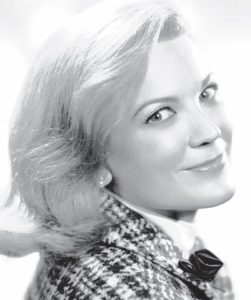REVIEWS: Soprano: Teresa Stich-Randall; Composer: Thomas ‘Fats’ Waller; Author: Evan Eisenberg
 REVIEW POTPOURRI
REVIEW POTPOURRI
by Peter Cates
Teresa Stich-Randall
Preiser 93458, CD, recorded July 31st, 1956.

Teresa Stich-Randall
Born and raised in Connecticut, Teresa Stich-Randall (1927-2007) had a major career of over 30 years, starting in the U.S. but mainly centered in Europe, as a soprano performing opera, and other forms of vocal classical music. To me, her fame is well deserved, she being one of a handful of sopranos who provide genuine pleasure through their recordings – because she avoids the cloying vibrato that turns, not only sopranos, but mezzos, altos, tenors, baritones and basses into very painful listening ordeals. She conveys the beauty in what she sings, rather than indulging in being a histrionic nimcompoop in how she sings!
The above CD is a collection of lieder, or classical songs by Mozart, Schubert, Schumann, Brahms, Richard Strauss and Debussy, 21 in all and each one a gem. She collaborates with the exceptionally phenomenal conductor, Hans Rosbaud (1895-1962), who swaps his conducting baton for the piano, performs with once-in-a-lifetime musicianship, sensitivity and beauty and leaves me wondering why he didn’t play the keyboard much more often. I posted Brahms’s Mondnacht on my Facebook page from YouTube, which should still have it !
A couple of little tidbits – Stich-Randall was a holy terror about exact punctuality for her voice lessons while Rosbaud mastered five instruments and relaxed by reading ancient and modern classics, in the original language.
Fats Waller
1935; Classics 746, CD.

Fats Waller
The phenomenal Fats Waller (1904-1943) was a masterful composer, orchestra leader, classical and jazz organist, pianist and one very entertaining singer. The 22 shellacs on this CD are all first class, with not a single dud among them, and remastered skillfully.
Evan Eisenberg
The Recording Angel
Penguin, 1987, 256 pages.

Evan Eisenberg
I had high hopes for this book when I forked over four bucks for it some months back. Superficial dipping into it led me to a story about Clarence, who collects records while living just barely on $270 a month and they consume his house with only minimal living space.
Such stories are few. Eisenberg devotes most of the book discussing how records have changed the way we listen to, and relate to, music. But he uses endless quotes from, and paraphrasing of Plato, Aristotle, Schopenhauer, etc., to discuss the endless byways of music for several centuries in an overblown manner that makes this book tiresome most of the time as a reading experience.
But it got glowing reviews from many critics.
Responsible journalism is hard work!
It is also expensive!
If you enjoy reading The Town Line and the good news we bring you each week, would you consider a donation to help us continue the work we’re doing?
The Town Line is a 501(c)(3) nonprofit private foundation, and all donations are tax deductible under the Internal Revenue Service code.
To help, please visit our online donation page or mail a check payable to The Town Line, PO Box 89, South China, ME 04358. Your contribution is appreciated!


Leave a Reply
Want to join the discussion?Feel free to contribute!